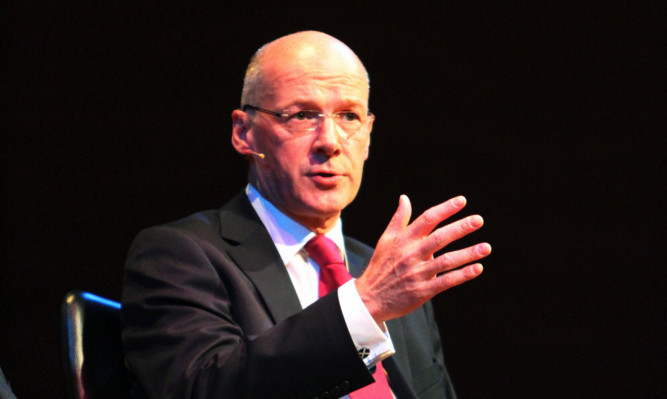The Scottish Government could reject more powers for Scotland in little more than two weeks unless an agreement is reached on the amount of money it will receive from Westminster, John Swinney has warned.
The Deputy First Minister said negotiations are reaching “the end of the road” and has set a February 12 deadline.
He confirmed the SNP administration will not back the Scotland Bill until it finds the associated cut to Scotland’s block grant acceptable.
He told Westminster’s Scottish Affairs Committee that the UK Treasury should not be in any doubt about the seriousness of the situation if the impasse continues.
Mr Swinney confirmed his continued support for Scottish independence and has not ruled out the possibility of full fiscal autonomy by the end of the next Scottish Parliament.
At the committee meeting in Perth, convener Pete Wishart (SNP) asked “how serious” the Scottish Government’s threat to veto the Scotland Bill is.
He said: “Would that therefore mean that the Scotland Bill, as it is currently being progressed through the House of Commons, would effectively fall?”
Mr Swinney said: “We would not put the question of legislative consent to the Scottish Parliament without being able, at the same time, to recommend an acceptable fiscal framework for implementation alongside the Scotland Bill provisions.
“So the answer to your question, convener, is yes.”
He added: “February 12 is there to signal the last moment that we can then embark on effective scrutiny of the fiscal framework within the Scottish Parliament as part of the legislative consent process.
“It’s the fact that we haven’t got an agreement on the block grant adjustment mechanism that is the difficulty and that is what we are trying to resolve.”
He said Holyrood scrutiny must be completed by March 17 to enable the third reading by the Lords by March 24.
Mr Wishart said: “Do you get the sense that the Treasury gets the seriousness of this?
“Are they aware of the timelines involved and do they understand that without a proper and full agreement there might be massive issues about the Scotland Bill being passed before the end of this parliamentary session at Westminster?”
Mr Swinney said: “Nobody in the Treasury can be in any doubt about the significance of the timetable that I have outlined to the committee.”
He said there is no “technical impediment” to a resolution but refused to reveal what issues are impeding the process while negotiations are continuing.
“That moment will come if we are unable to get an agreement,” he said.
“We’re not at the moment of no agreement yet.
“We’ve got a couple of weeks in which we have got to conclude this process, and if we don’t conclude this process then we will not be able to legislate, to advise parliament to support a legislative consent motion, so we’re not at the end of the road yet.
“We are getting kind of close to the end of road, and I think we have still got a lot of distance to travel.”
Mr Swinney said he does not see the Scotland Bill as a “line in the sand” but acknowledged that others hope it will be an enduring settlement.
He confirmed that the Scottish Government believes “in independence for Scotland”, and said its continuing drive for full fiscal autonomy will depend on how the constitutional debate develops.
“We want Scotland to be an independent country but I have to accept the fact that there was a referendum fairly recently that took the view that that was not to be the case,” he said.
“We have argued as part of the discussions around the Smith Commission for there to be a wider range of powers than we currently have but that has not been agreed by the UK Government.”
Conservative MP Christopher Chope said: “If your Government is re-elected in May, do you see full fiscal autonomy being implemented before the next Scottish Parliament elections?”
Mr Swinney said: “That would depend on a whole series of questions around the constitutional debate and the interactions between the Scottish and UK governments on the constitutional question.”
